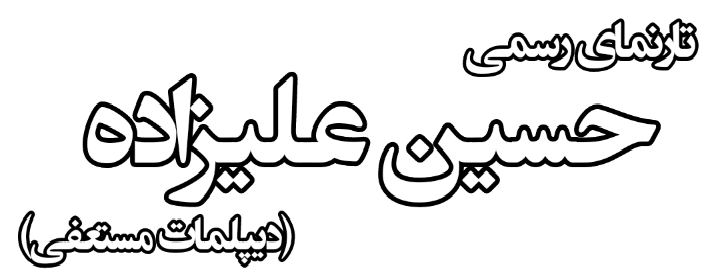English articlesصفحه نخست
A Letter to Dr. Ahmed Shaheed The UN Special Rapporteur for Human Rights in Iran by a Former Diplomat
His excellency Dr. Ahmad Shaheedd The UN special rapporteur of human rights in Iran What compelled me to write this letter is the fact that we share a common background serving as diplomats for our countries. Such commonality brings us closer together and encourages mutual understanding of a single issue. With your remarkable background as Foreign Minister of the Maldives, now the most highest international organization trusts you to investigate the human rights situation in my country. Yet I, former charge d’affaires in Finland, after 21 years of service in the Iranian Foreign Ministry, am now a political refugee in my host country, Finland

“He who has nothing to hide, has nothing to fear”
His excellency Dr. Ahmad Shahid
The UN special rapporteur of human rights in Iran
What compelled me to write this letter is the fact that we share a common background serving as diplomats for our countries. Such commonality brings us closer together and encourages mutual understanding of a single issue. With your remarkable background as Foreign Minister of the Maldives, now the most highest international organization trusts you to investigate the human rights situation in my country. Yet I, former charge d’affaires in Helsinki, after 21 years of service in the Iranian Foreign Ministry, am now a political refugee in my host country, Finland.
My colleagues and I, protesting against the merciless crackdown on the Iranian people and desiring to relay the cry of a suffering and helpless nation to the world, saw no alternative but to execute a political move reflecting all victims of the Islamic Republic’s human rights violations: the stifled voices, stitched mouths, bruised chins, bound prisoners, lost martyrs, childless mothers, shuttered newspapers, dissolved political parties, prohibited minority religions, and most importantly, punished defense lawyers.
Excellency,
I write this open letter so I can reiterate the thousand-fold, relentless human rights violations in Iran. I’m confident that dozens of UN resolutions, hundreds of statements from human rights organizations, and thousands of testimonies to the inhumane tragedies in the black hole called the “Islamic Republic” are sufficient documentation to detail the crimes of depraved officials and vulgar rulers. Such records are enough to enlighten you of the tragedies that abound in the Islamic Republic.
Is there better rationale than the Islamic Republic became the first country appointed a special human rights Raporteur to investigate and assess its human rights situation since the Council’s founding in 2006? If there wasn’t any satisfying proof or documentation, the Council would never have thought of appointing Iran a human rights Raporteur.
The solid proof to show the critical human rights situation in Iran is not but Islamic Republic senior officials’ harsh reaction of “blocking the Raporteur’s entry into Iranl”. This illustrates the depth of the horrible and monstrous tragedies taking place in my country.
The Persian poem quoted at the beginning of this letter is an Iranian’s simple description of crooks involved in bad actions. Let’s imagine that an Iranian citizen, accused of possessing stolen property or hiding a body in his home, gets investigated by the court. What better proof for his guilt than when he professes to be innocent but refuses to allow officials to search his home? Thus the Persian poem says:
“He who has nothing to hide, has nothing to fear.”
Excelency,
This explains why Islamic Republic officials—from the head of the judiciary to the Foreign Minister, head of the National Security Council, and the IRGC’s Top Commander—hold the flag symbolizing their refusal to let you enter our loved country. Dissecting their foolish talk, it is very appalling that on one hand the so-called Iran’s president calls Iran “the most free country in the world” and Javad Larijani, head of the human rights desk at the Judiciary, calls Iran “the only democracy in the Middle East” while the Judiciary’s head Sadeq Larijani boldly announces that “Our policy is not to accept the correspondent”.
It is also distressing to hear Sadeq Larijani say that “The basis of Western-style human rights is not enforceable, and we cannot let them impose on us a notion of human rights adopted from a liberal cultural system. Our religious regime can itself create a human rights system based on its principles.”
Did the world forget that the Islamic Republic, until yesterday, was very keen on becoming a member of the Human Rights Council? Maybe the Islamic Republic forgot that it must execute the terms of a contract, treaty or convention unless it pulls out. What is the difference between accepting unexpected IAEA inspections of Iran’s nuclear sites (since the IAEA is an international authority), and accepting a special Raporteur from another international authority, the Human Rights Council?
Excellency,
The head of the judiciary knows well that even if there wasn’t an international human rights treaty or any other treaty containing the Islamic Republic’s signature, these government officials would still have commitments over the violations of the country’s laws and Constitution. Iran’s defying its international obligations is another story. Let me give you an interesting example.
Based on the Islamic Republic’s civil code (derived from Islamic jurisprudence), a person is considered innocent until proven guilty by a legitimate court. It is appalling that in a country claiming to be free and democratic, two prominent Islamic Republic figures, former Prime Minister Mirhossein Mousavi and former head of Parliament Mehdi Karroubi have been under house arrest for long months. No verdict issued is issued to sentence (or condemn) them.
Considering the Islamic Republic’s contradictory treatment of the civil code and the Constitution, the question is: if Mehdi Karroubi and Mousavi are gulity why their wives are under house arrest as well? You must acknowledge that the Islamic Republic’s problem begins with this simple example and ends with what Nobel Peace Prize winner Shirin Ebadi truely states to be thousands of systematic human rights violations.

